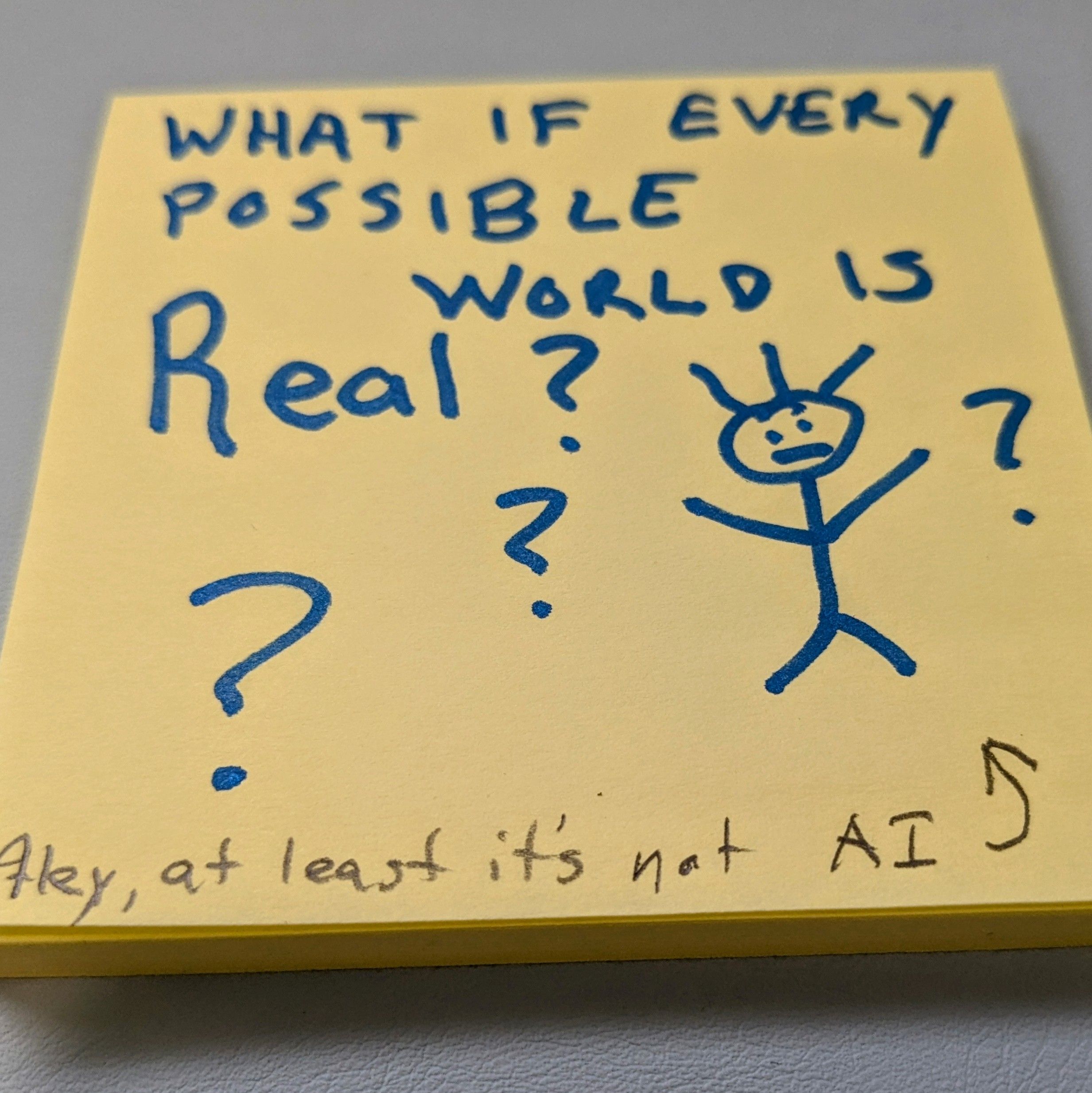The problem is not that we're all about to die
...the problem is, we'd know it.
Jump to section titled: ...the problem is, we'd know it.The argument from freedom requires us to examine and reject alternative families of ideas that aspire to explain why reality IS and why it is the way it is. One such family are variants on the idea that every possible world exists, and we happen to live in one that supports sentient life.

And why not? If every possible world is real we can avoid having to accept that the universe is arbitrary. It's an alternate path to a "free" universe, and one where there can be crisp objects, and logical and mathematical descriptions of reality might be perfectly valid.
It's a popular idea, and seems to offer an alternative to a universe with brute facts or supernatural causes. You might see variants voiced by both philosophers (versions of David Lewis's "modal realism") and physicists; this is the "multiverse" physicist Lawrence Krauss ultimately relies on, in A Universe from Nothing.
Possible Worlds and the Anthropic Principle
Jump to section titled: Possible Worlds and the Anthropic PrincipleSo what's wrong with the answer, "every possible world is real"?
In Ontic Vagueness (sec. 2.3) I challenge this family of ideas in three ways. One is especially fun and I had not heard it before I wrote it so may be new to you too: these arguments lean heavily on a misapplication of the Anthropic Principle.
If every possible world is real, the argument begins, isn't it super weird that we live in a reality that can support life? (See fine tuning arguments for how weird it is). "Nope," the many-world-ologist replies: of COURSE we live in one of the worlds that support sentient life. Otherwise we would not be here to talk about it.
The latter argument is the Anthropic Principle, and there nothing wrong with it... sometimes. For example, when it comes to explaining why we are living on a planet with a fairly stable temperature, liquid water, and so forth - rather than on a cold, untethered rock passing through a hydrogen cloud somewhere in deep space. But in the context of the "every possible" hypothesis, the Anthropic Principle fails.
Why?
Jump to section titled: Why?The Anthropic Principle is only good for the past.
If "every possibility" is real, we're just riding the infinities, picking out the tiny number of paths where sentient life can exist in this moment (and could exist up to this moment). The Anthropic Principle explains how we ride the infinities - we can die horribly in 99.9999% of worlds in a moment, and there are always a subset of possibilities 0.0001%, say, where we did not die a moment ago. And the Anthropic Principle can explain this: here we are in one of the many worlds where life could survive the previous 10 minutes.
But then it falls down: the Anthropic Principle fails to explain why we cannot see that we are about to die a horrible death (in 99.999% of worlds). The Principle only helps us ride the infinities of the past; but when it comes to imminent, apocalyptic events, it does not protect us from observing that we are well and truly doomed. Not until after said events have killed us off.
So the failure of the Anthropic Principle in a multiverse scenario is that it fails to explain why the future looks so rosy.
Afterword
Jump to section titled: AfterwordCan I make this "rosy-looking-future" argument unironically going into 2025? A Rogue Philosopher can! But there are rules. Works of rogue philosophy must be made available for free. This argument comes from the rogue treatise I rogue published yesterday - PDF here (somewhere in section 2.3).
Links
Jump to section titled: Links- Open access PDF Ontic Vagueness: The Argument from Freedom
- Kindle version Ontic Vagueness: The Argument from Freedom
License
Jump to section titled: LicenseCopyright © Adam Weisberg (2025) Creative Commons Attribution Non Commercial No Derivatives 4.0 International